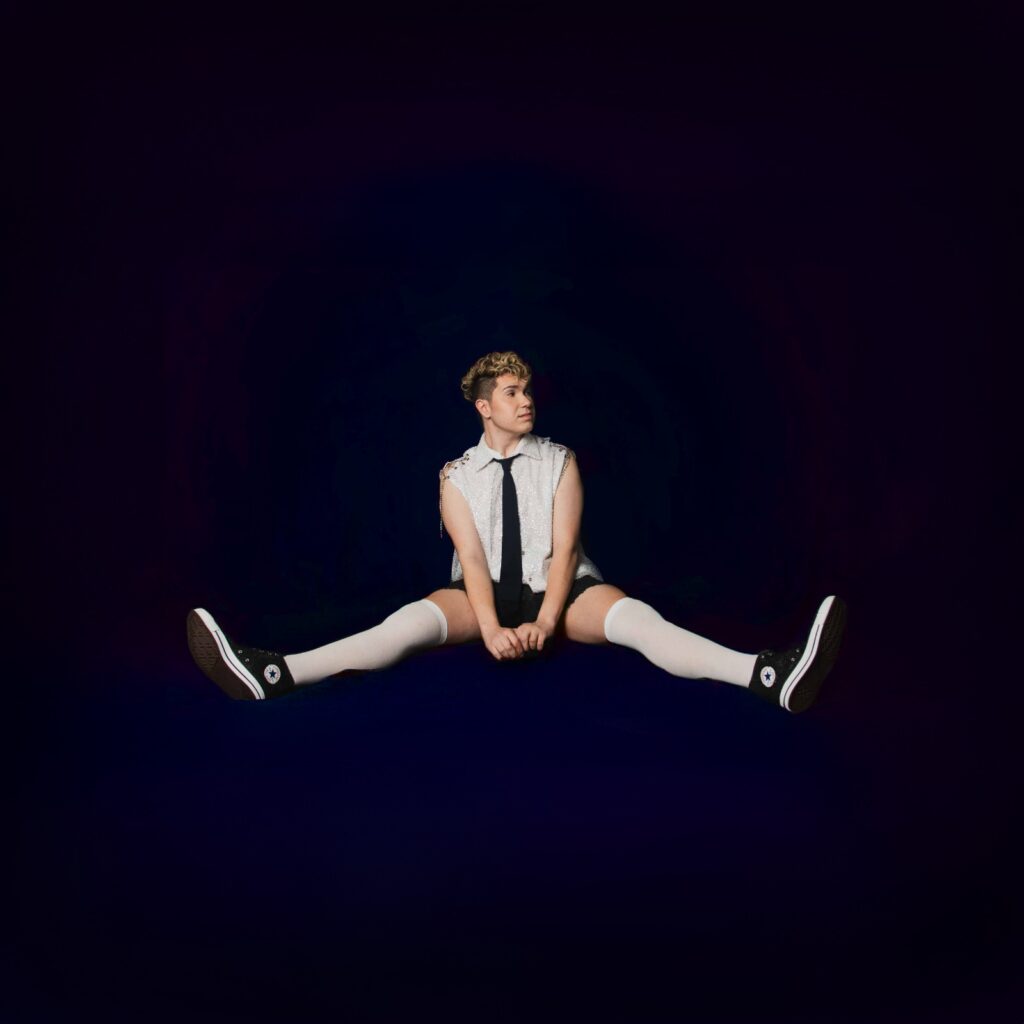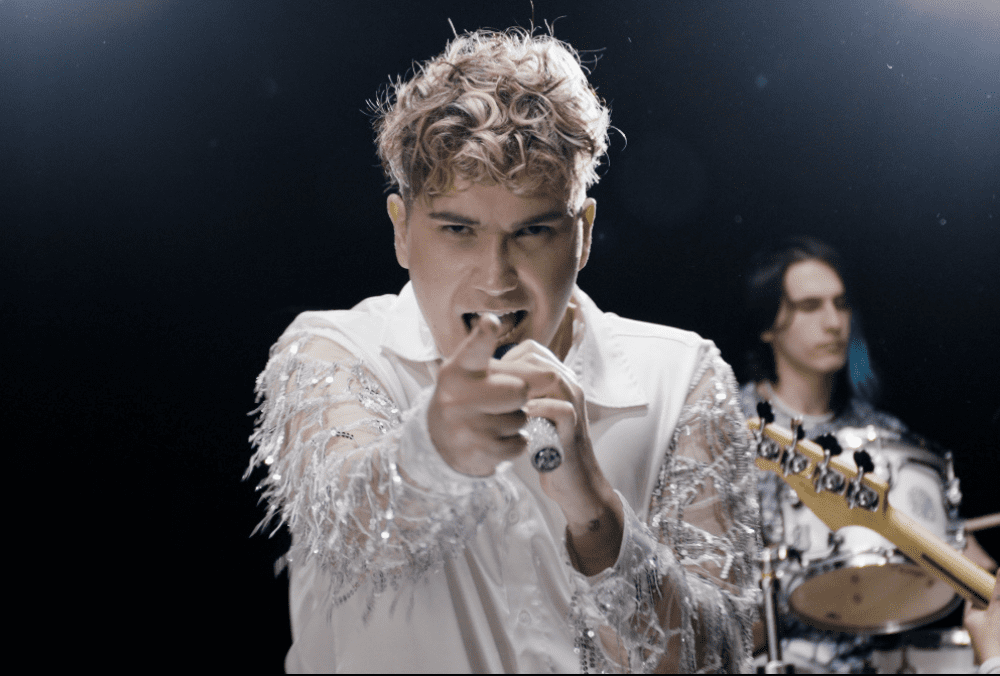“This is me. I’m recording the video, and I’m releasing this as my debut.”
With those words, Vini made the leap from artist-in-hiding to full-fledged pop storyteller. Born in Brazil, raised in Argentina, shaped by life in San Diego and London, and emotionally wired to write in English, Vini is bringing a deeply vulnerable, richly textured narrative voice to the rising tide of alternative pop. In this intimate conversation with us, the artist behind “I’m Happy for You” unpacks debut nerves, sonic surprises, and why success doesn’t always mean stadium lights.
Who was the first person you played the demo of “I’m Happy for You” for—and what was their reaction?
The first person to hear the full version was my vocal coach. Honestly, I don’t think the song would be what it is without her. She’s such an amazing person, and I love her deeply, just like I do my producer, Leandro Uriel Fernandez, who’s honestly the best producer ever. When I showed my vocal coach the song, we were on a short break, and she hadn’t seen me in a while. Her reaction was like, “Oh my gosh, this is so different!” She thought it was really catchy, and it meant so much coming from her. After that, I showed it to my mom and godmother. My mom hadn’t really heard me sing like that since I was about 14 or 15, so it was an emotional moment for both of us.
Were you nervous to release such a personal story so early in your career?
So nervous. You have no idea. I’m still nervous every day. I come from a small town, and while I love it, sometimes I feel like people judge my voice because it’s different. Before releasing the song, I had a week where I cried every single day and then another where I was super excited. It was a roller coaster. But eventually, I just said, This is me. I’m recording the video, and I’m releasing this as my debut. Whether people like it or not, it’s my story, and I love surprises, so I knew this had to be the first chapter.
Do you think this song marks the beginning of a sonic theme in your album, or is it the outlier?
This song wasn’t even meant to be on the album at first! It just kind of came out of nowhere, and I ended up loving it so much that I worked the lyrics and structure to fit into the album’s overall concept. The album is very much a storytelling experience. It starts with an intro, leads into this track, and each song after that explores a different theme that ties into a final song offering some kind of resolution. Sonically, you’ll hear alternative pop, pop rock, synth sounds from the ’80s and ’90s, and even a bit of early 2000s and country pop. It’s cohesive but full of surprises.
When you feel creatively stuck, what’s your go-to reset ritual?
I’ve had a few months like that, where I felt like I had nothing to say. In those moments, I start imagining: What if my life were different? Like, what if I were already famous? That shift in perspective helps. Sometimes I go out with friends, and that inspires a song. Or I’ll watch a show, read a poem, or scroll online and suddenly find a line that sparks something. I don’t write every day, that’s just real, but when I do write, I’m all in. If I weren’t a singer, I think I’d be a writer or maybe an English teacher.

Spanish is your first language—have you written any songs in Spanish, or do you plan to release one soon?
Actually, my first language was Portuguese, then Spanish. I’ve tried writing in Spanish, but I just couldn’t—it’s something psychological, I think. With English, I can say things I wouldn’t say in my native language. That’s not a knock on my culture—I love being Brazilian and Argentinian, but I’m not sure if people would take my deeper, more metaphorical writing seriously in Spanish. One day, I’d love to release something in Spanish or Portuguese, maybe even an EP celebrating Latin American culture, but right now, English feels like home for my songwriting.
You grew up between two cultures—how does that duality show up in your music?
Right now, I don’t think it shows up much in my music, honestly. My sound leans more into English-language pop and rock. But I deeply admire artists from both Brazilian and Latin cultures—like Karol G, Anitta, J Balvin, Shakira, Juanes, Lali, Tini, Maria Becerra, Luísa Sonza… the list goes on. They’re all amazing. Still, musically, I’m more inspired right now by artists like Olivia Rodrigo, Tate McRae, Taylor Swift, and Gracie Abrams.
What was the last song by another artist that made you stop everything and listen?
I’m obsessed with Lorde (Virgin), like, crazy obsessed. Her writing is on another level. Melodrama, Pure Heroine, Solar Power—everything she does is incredible. I’d love to see her in concert one day. I’m also a huge Camila Cabello fan. Her albums CXOXO and Romance were so good. And of course, I’m always listening to Taylor and Billie too. But right now, Lorde has me in a chokehold.
You’ve lived in Brazil, Argentina, San Diego, and London—where does your soul feel most at home?
London. That city helped me so much with songwriting and with myself. In San Diego, I struggled a lot with depression, even though I love the city. But in London, I felt like I could finally open up. It was like unlocking a vault from my old diary and saying, I’m ready to show the world who I really am. Argentina also holds a big part of that healing. So right now, it’s between those two places.
What would your 14-year-old Musical.ly self think of the artist you are today?
He’d be shocked, honestly. My original plan was to be an influencer, then an actor, and finally a singer. But life flipped that script. I became a singer before anything else. I’d tell my younger self, You’ve lived so much already. Be proud of every listen, every stream, every poem you write. Just live the moment, stay grounded, and don’t ever let your feet leave the earth. I don’t have the most virtuous voice, but I’m a songwriter, and I’m giving it everything I have.

You’re not just a TikTok artist but a storyteller on the app—what’s a TikTok trend you would never do, even as a joke?
I wouldn’t touch anything political or religious. I think everyone deserves to have their own opinions without being forced to change. I also stay away from anything hateful, like making fun of another artist’s work. Even if a song doesn’t sound great to me, I know they poured effort into it. I try to bring positivity to the platform. These days, I use TikTok mostly to promote my music and post some goofy stuff.
What’s your personal definition of success right now?
Success for me isn’t about millions of streams or sold-out stadiums, though, of course, that would be amazing. Success is seeing my face and name on a digital platform. It’s having my lyrics registered, my music video getting 60,000 views, or my song reaching 20,000 streams. It’s writing every lyric on my album myself and seeing it all come to life with my producer and vocal coach. Every song I finish is already a victory. That’s what success means to me right now.
Vini doesn’t measure success in numbers but in moments of creative truth—and yet, the numbers are showing up anyway. With “I’m Happy for You” already reaching beyond what he once considered milestones, it’s clear that listeners are connecting to more than just a song—they’re hearing a story that’s real, raw, and entirely his. This is the start of a journey defined by heart, honesty, and an artist who’s just getting started.






